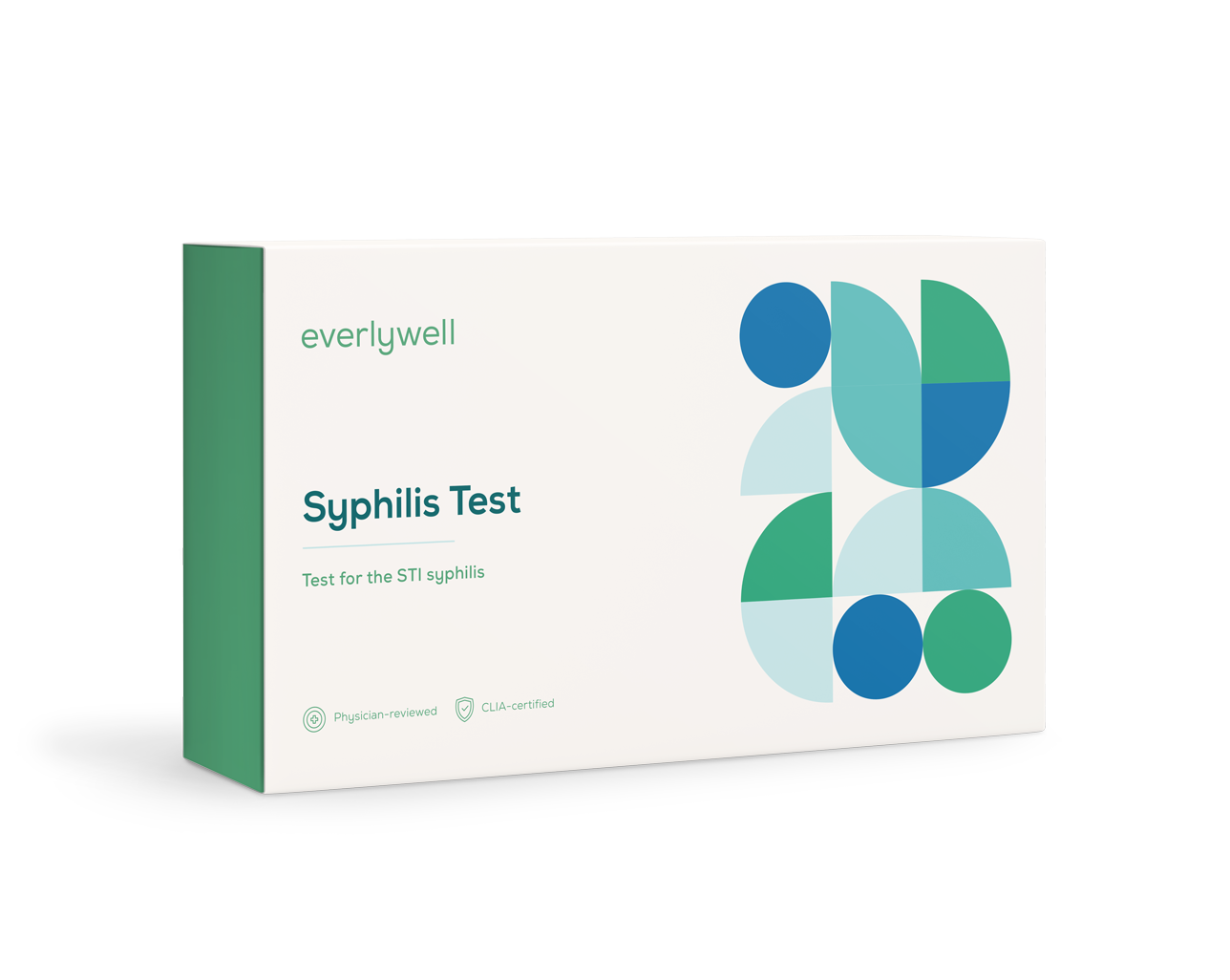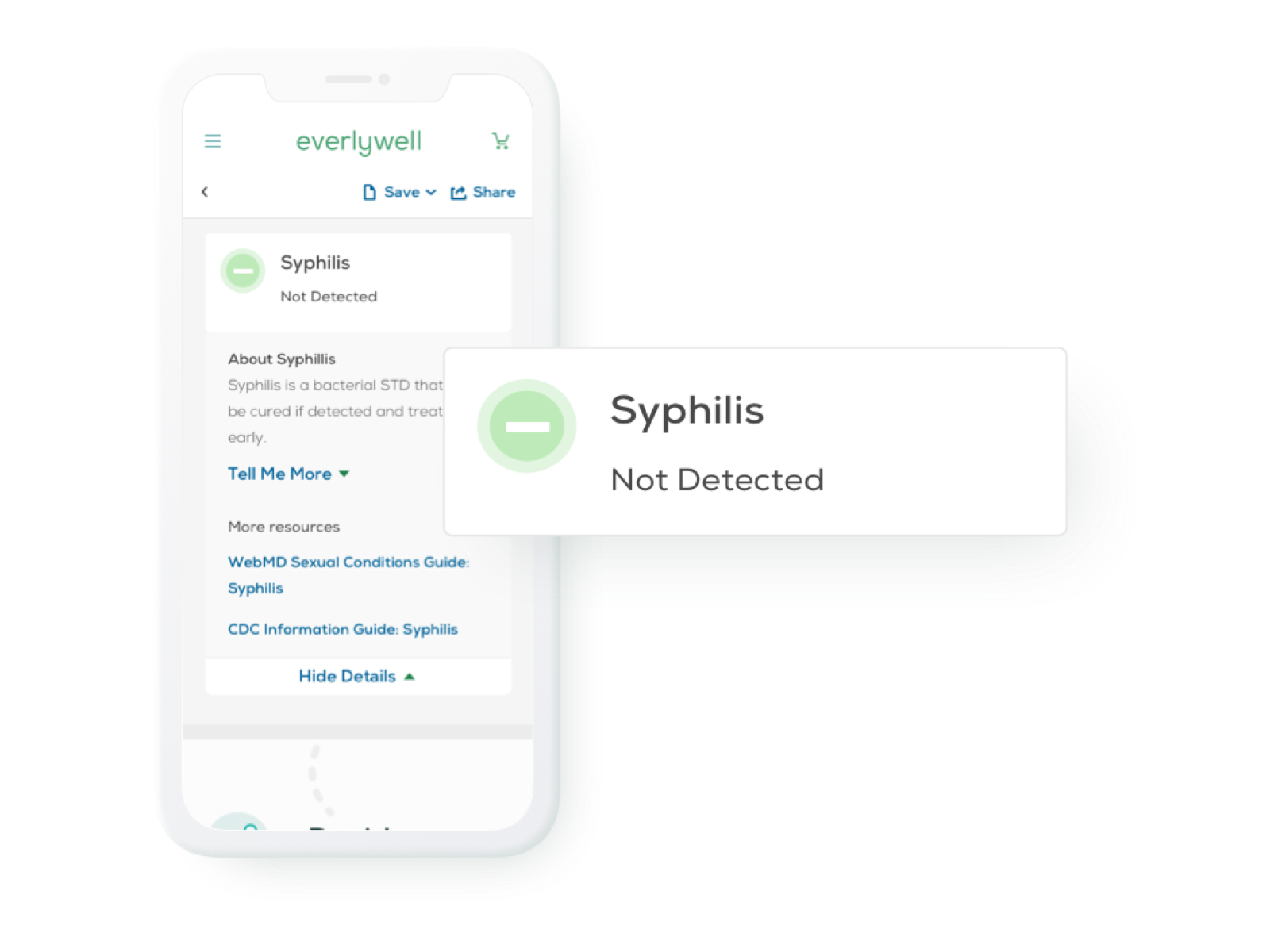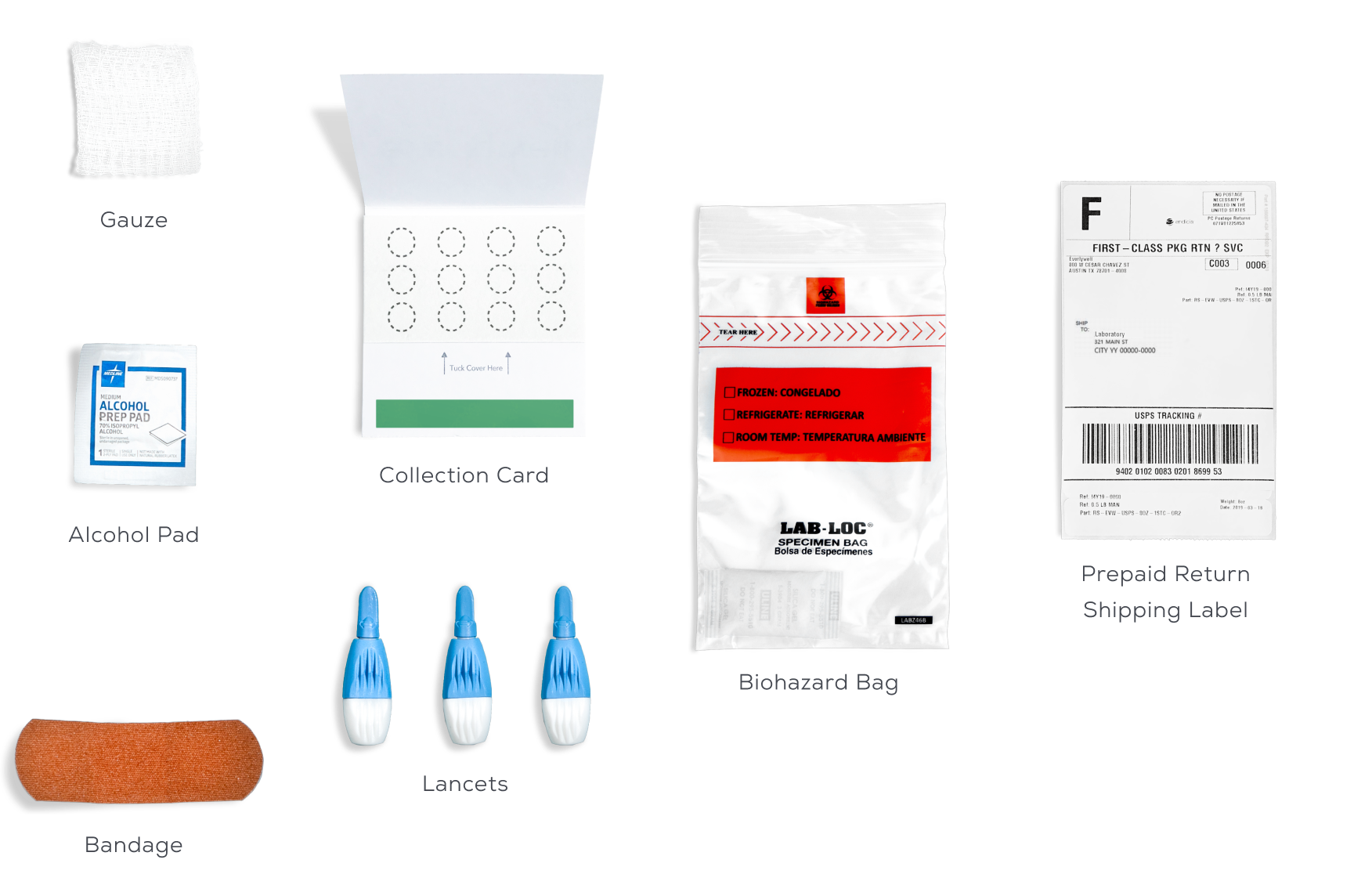








Syphilis Test
$49
Free Shipping • FSA / HSA accepted
This at-home lab test will check for antibodies to Treponema pallidum, the bacteria responsible for causing the sexually transmitted infection syphilis. In the event that your test results are abnormal, you’ll have the opportunity to connect with our independent physician network at no additional cost to discuss your particular case.
Measures exposure to syphilis bacteria
Finger prick sample collection
Discreetly test for syphilis









Syphilis Test
This at-home lab test will check for antibodies to Treponema pallidum, the bacteria responsible for causing the sexually transmitted infection syphilis. In the event that your test results are abnormal, you’ll have the opportunity to connect with our independent physician network at no additional cost to discuss your particular case.
Measures exposure to syphilis bacteria
Finger prick sample collection
$49
Select Subscription Frequency
YOU SAVE $13 (25%)
YOU SAVE $10 (20%)
YOU SAVE $8 (15%)
Free Shipping • FSA / HSA accepted
Free Shipping • FSA / HSA accepted
Questions?
Syphilis: What It Is, And Who's At Risk
Syphilis is a bacterial infection caused by the bacterium Treponema pallidum. It’s spread by sexual contact—including vaginal, anal, and oral sex—with someone who’s infected. This test won’t be able to tell you the specific site of the infection, but it will be able to detect an active or past syphilis infection.
The Everlywell Syphilis Test screens for antibodies which are generated by an immune response to the bacterium Treponema pallidum. These antibodies remain in your system even after syphilis has been treated. Therefore, the Everlywell Syphilis Test is not recommended for anyone who has been previously diagnosed and cannot be used to monitor treatment.
Over 133,945 new cases of syphilis were reported to the Centers for Disease Control and Prevention (CDC) in 2020, and the total number of infected individuals in the United States has been increasing over the past few years.
Pregnant women infected with syphilis can spread it to their unborn children during pregnancy (resulting in congenital syphilis). Men who have sex with men and men who have sex with all sexes comprise the largest group of infected individuals, totaling just over 43% of all reported cases to the CDC in 2020. It’s recommended that anyone who has had sexual contact with a person known to be infected with syphilis, men having sex with other men, pregnant women, sexually active people with HIV infection, and anyone taking PrEP for HIV prevention should get tested for syphilis.
This test is used to detect the presence or absence of the Immunoglobulin G syphilis antibody. Your test results will show if antibodies were detected in your sample.
As with all Everlywell tests, our at-home lab test is delivered in discreet packaging and taken in the privacy of your own home. Once you return your blood sample to our network of labs and your sample is processed, you’ll be notified via email when your results are ready. You will then be able to access your test results through an easy-to-read dashboard on our secure online platform.
This test is a treponemal test, which means that it looks for antibodies to the syphilis-causing bacterium. Because antibodies remain in the blood following infections, this test cannot be used to differentiate between an active syphilis infection and a successfully treated syphilis infection. In the event that your test result is abnormal, you’ll have the opportunity to connect with our independent physician network at no additional cost to discuss your particular case and determine next steps, which may include confirmatory testing.
The Syphilis Test checks whether or not you test positive for antibodies against Treponema pallidum, the bacterium that causes syphilis. In the event that your test results are abnormal, an associate from our physician network will contact you directly to discuss your particular case as well as provide information on how to take the next steps, which may include confirmatory testing.
In rare cases, you may not receive a definitive test result because of early syphilis infection or inadequate sampling. If the sample is inadequate, Everlywell will suggest repeat testing. Know where you stand with our at-home Syphilis Test.
We take customer privacy very seriously and will never share your information with a third-party with the exception of the lab we use to test your sample and our physician network.
Will my results be shared with my state health department?
As is the case with all sexually transmitted disease testing—whether through Everlywell or your healthcare provider—we may be required by law to report positive test results to certain state health departments. This is completely confidential and is only done to track infection prevalence.
Syphilis symptoms
A syphilis infection is associated with certain signs and symptoms based on the phase of the infection:
- The earliest stage (or "primary syphilis"), is associated with a firm, round, painless sore on the genitals. The sore, called a “chancre,” usually goes away after several weeks, even if the infection isn’t treated.
- Untreated syphilis can advance to a secondary syphilis stage of infection, which can be characterized by skin rashes, fever, patchy hair loss, headaches, muscle aches, fatigue, and other symptoms.
- The latent stage is the next stage of an untreated syphilis infection. Latent syphilis often occurs without obvious signs or symptoms, but that doesn’t mean the infection has gone away. On the contrary, during the latent syphilis stage, the infection persists in the body—sometimes for years—and can ultimately lead to tertiary syphilis, which damages organ systems like the nervous system, heart, and eyes.
Neurosyphilis
In some cases, syphilis bacteria can attack the nervous system—resulting in “neurosyphilis.” Neurosyphilis—a condition that can develop at any point in a syphilis infection—can lead to severe brain disorders characterized by dementia, loss of muscle coordination, and more.
Because the signs and symptoms of neurosyphilis are similar to those of other disorders, a diagnosis requires lab testing via a lumbar puncture—or “spinal tap" (so spinal fluid can be analyzed).
More specifically, in a lumbar puncture, a needle extracts a sample of cerebrospinal fluid from the spinal cord (the system of nerves and vertebrae that runs down the back and transmits signals between the brain and the rest of the body). The cerebrospinal fluid is then checked for syphilis bacteria to determine if the infection has reached the nervous system.
Syphilis diagnosis
Two types of syphilis tests can screen for and diagnose syphilis (along with consideration of signs and symptoms potentially caused by this sexually transmitted disease). Syphilis testing can be done with a treponemal test or a non-treponemal test. Both syphilis tests are required to confirm a diagnosis.
Treponemal tests
Treponemal tests check blood samples for antibodies that react with certain molecules (syphilis antigens) that are unique to the syphilis bacterium. (Antibodies are specific compounds made by your body in response to bacterial infections, viruses, or other microbes. They help tag foreign pathogens for destruction by the body’s immune cells.)
The Everlywell Syphilis Test—which lets you check for syphilis antibodies from the privacy and convenience of home—is a treponemal test.
Non-treponemal tests
Non-treponemal tests are some of the oldest antibody tests that check for syphilis antibodies, and are widely used by many laboratories since they are needed for diagnosing an infection.
During an active infection, syphilis bacteria produce a very specific compound known as “cardiolipin-lecithin-cholesterol.” In response, your immune system makes antibodies that react with this compound that tell your immune system’s defender cells where the infection is taking place in the body.
Non-treponemal tests measure how much, if any, of these syphilis antibodies are in a blood test sample. The Rapid Plasma Reagin antibody test (or RPR test) and Venereal Disease Research Laboratory test (also known as a VDRL test) are some of the most commonly used. Both the RPR test and VDRL test evaluate antibodies in your blood to determine if you have been infected with bacteria that cause syphilis.
What’s the difference between a treponemal and nontreponemal test?
Treponemal tests give either a “positive” or “negative” result. Treponemal tests are often used as screening tests, where a positive result indicates that additional testing for syphilis is needed to confirm the diagnosis.
Non-treponemal tests can give a numerical result because these tests measure the amount of antibodies that react with syphilis bacteria compounds. This makes non-treponemal tests useful for determining what stage the infection is in—and how the infection responds to treatment (based on the amount of antibodies in the blood sample).
What about rapid testing for syphilis?
In certain specific clinical situations, rapid tests that check for syphilis and give results in 10 to 15 minutes may be used, but additional syphilis testing with a nontreponemal test is needed for a diagnosis (in the event of a positive result on the rapid test).
Would you like to order this test?
Shipping Address
,